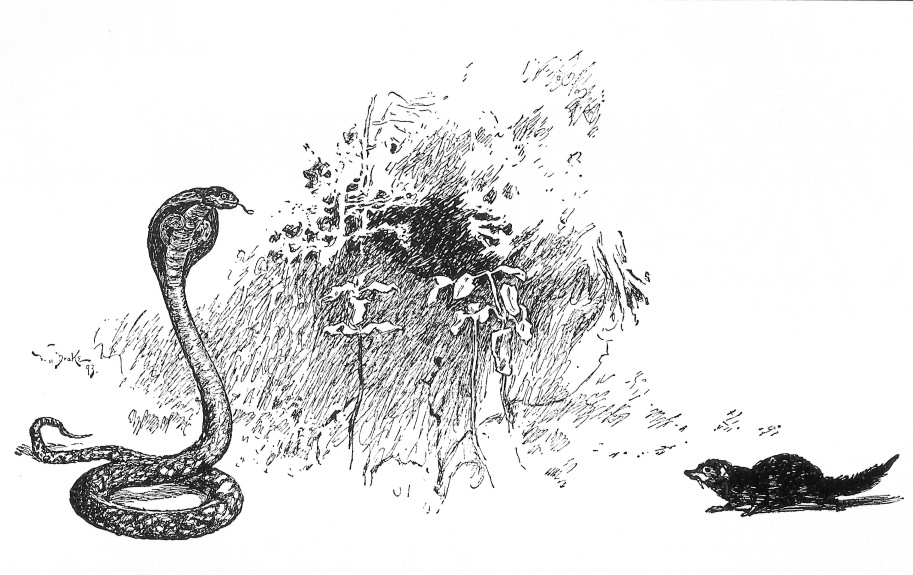Read the previous part here…
Though well-versed in the sciences, if you have no practical knowledge, you will become the object of ridicule, much like those foolish pundits were ridiculed by everyone, since they had no knowledge of worldly-affairs.
“How did that happen”, said VairāgyaKumar.
TruptaKumar replied…

मूर्खपण्डितकथा
The story of the foolish Pundits
In a city, not too far away from here, lived four friends. When they turned twelve, they set out to the city of KānyaKubja, to further their education. There, they stayed for twelve long years, studied sincerely and became pundits (of all the books that they had read).
One day, they all decided that they had studied enough, and so sought permission from their gurukul, to return to their city. Permission granted, the young men set out the very next day.
The roads had changed, and so they started to find it difficult to navigate their way back to their own city. After a while, they came to a road that forked out in two directions – east and west. “Which way do we take”, they all wondered.
Around that same time, a funeral procession of the son of a merchant in the nearby village, passed them and continued onto the road that turned west, since the cremation ground was located on that road. Seeing this, one of the young pundits remembered what he had read – “महाजनो येन गतः स पन्थाः”
“Let us follow the crowd (महाजना:)”, he declared.
This story contains instances of misinterpretations – and issues that arise out of them. I will interspace the story with my short explanations in italics, so that you can follow the story. It is much easier in Sanskrit, or Hindi, since the narration itself contains the pun…in English, one has to digress and provide an explanation:)
Here, the sentence “महाजनो येन गतः स पन्थाः” is meant to state – the path that is taken by a great man (महाजनः) is the best path, that is, one should follow the footsteps – the words and actions of great men. It is part of a pada of the Mahabharata – तर्कोऽप्रतिष्ठः श्रुतयो विभिन्ना, नैको ऋषिर्यस्य मतं प्रमाणम् । धर्मस्य तत्त्वं निहितं गुहायां, महाजनो येन गतः स पन्थाः ।। – Logic is devoid of conclusions and not foolproof, the scriptures have many derivative meanings, there is no one wise person whose philosophy can be termed as authentic or complete. In reality, the essence of Dharma is mysterious and hidden. Therefore only this can be said that the path on which great realized souls have traversed, is the path of Dharma.
The young pundit, on the other hand, misinterpreted महाजनः as – a large number of people, and so followed the crowd instead.
As they entered the cremation ground, they saw a donkey standing near the crowd. The second pundit remembered:
उत्सवे व्यसने प्राप्ते दुर्भिक्षे शत्रु-सङ्कटे ।
राज-द्वारे श्मशाने च यस् तिष्ठति स बान्धवः ॥ ३९ ॥
utsave vyasane prāpte durbhikṣe śatru-saṅkaṭe |
rāja-dvāre śmaśāne ca yas tiṣṭhati sa bāndhavaḥ || 39 ||
At a festive gathering, in sad occasions, in times of famine, when enemies attack, at the palace durbar and at the cremation ground – whoever stands by you, is your true well-wisher.
“This donkey is standing next to us, and so is our well-wisher”, he declared. On cue, one of the pundits embraced it, while the other washed it’s feet and showed it a lot of respect.
They then looked around, and noticed a camel running across the ground. “What was that?”, asked one.
“धर्मस्य त्वरिता गतिः” – “The ways of Dharma are fast, so that was Dharma”, declared the other.
“धर्मस्य त्वरिता गतिः” is part of a larger sloka – क्षणं वित्तं क्षणं चित्तं क्षणं जीवितं आवयोः यमस्य करुणा नास्ति धर्मस्य त्वरिता गतिः , which means wealth is unstable, the mind is fickle, our life too is momentary. As Lord Yama (Lord of Death) has no mercy, one should perform good deeds immediately, rather than wait for an opportune moment.
The third pundit exclaimed “इष्टं धर्मेण योजयेत् – One should tie a well-wisher to Dharma” and so the fourth grabbed the donkey and tied it to the camel.
सत्कुले योजयेत् कन्यां पुत्रं विद्यासु योजयेत् ।व्यसने योजयेत् शत्रुम् इष्टं धर्मेण योजयेत् ॥- चाणक्य नीति
A wise person should marry his daughter into a noble family and make arrangements for good education of his son. He should plan to make his enemies addicted to bad habits and motivate
his friends towards the path of Dharma.
to be continued…
